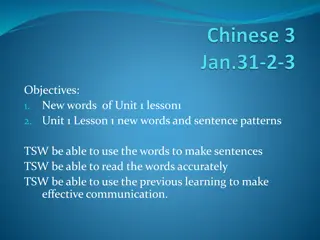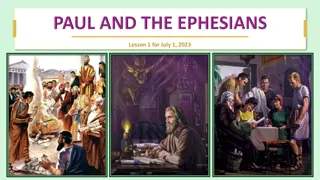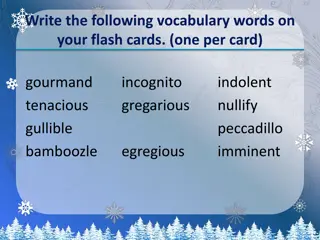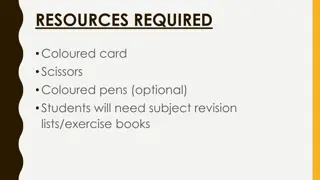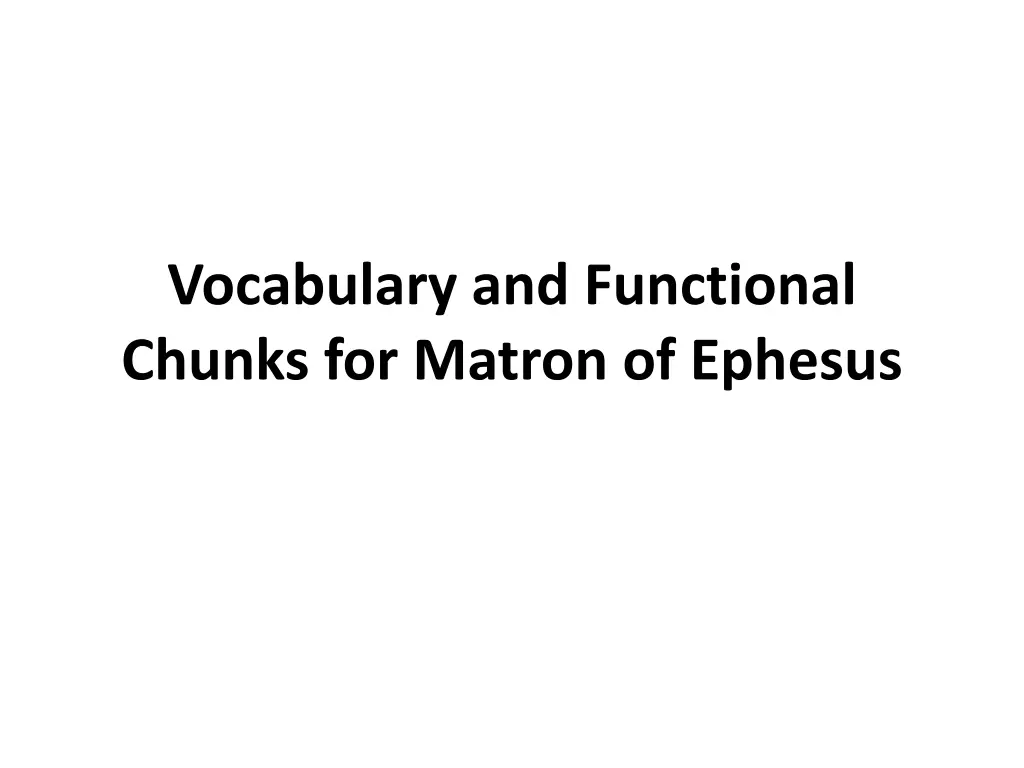
Vocabulary and Functional Chunks for Matron of Ephesus Exemplified
Dive into the intriguing tale of Matron of Ephesus, illustrated through vocabulary and functional chunks. Explore her journey of dry abstinence defiance, chest laceration, public chest beating, and more, all with linguistic insights.
Download Presentation

Please find below an Image/Link to download the presentation.
The content on the website is provided AS IS for your information and personal use only. It may not be sold, licensed, or shared on other websites without obtaining consent from the author. If you encounter any issues during the download, it is possible that the publisher has removed the file from their server.
You are allowed to download the files provided on this website for personal or commercial use, subject to the condition that they are used lawfully. All files are the property of their respective owners.
The content on the website is provided AS IS for your information and personal use only. It may not be sold, licensed, or shared on other websites without obtaining consent from the author.
E N D
Presentation Transcript
Vocabulary and Functional Chunks for Matron of Ephesus
aliquot dierum abstinentia sicca passa est frangi pertinaciam suam dry from the abstinence of some days suffered her own obstinance to be broken Nota Bene: passa est is perf act dep; frangi is pass inf
at illa ignota consolatione percussa laceravit vehementius pectus but that one, having been struck by the unknown/ base consolation, she tore her chest more vehemently
aut nudatum pectus in conspectu frequentiae plangere or to beat her new chest in the sight of a crowd
ceterum scitis quid plerumque soleat temptare moreover, you know what for the most part is accustomed to tempt/ try Nota Bene: soleat is pres subj in ind quest
coepitque hortari lugentem ne perseveraret in dolore supervacuo and he began to urge the mourning one, lest she persevered in empty/ useless grief Nota Bene: hortari is dep; perseveraret is imp subj in ind command
conciliante gratiam ancilla ac subinde dicente with her slave-girl bringing together thanks/ favor and saying suddenly/ repeatedly Nota Bene: ablative absolute
concupiit scire quis aut quid faceret he desired strongly to know who or what was making [the sound] Nota Bene: faceret is imp subj in ind quest
cum virum extulisset when her man had been carried out [for burial] Nota Bene: extulisset is pluperf subj in cum clause
deinde retecta potione et cibo then having been repaired by the drink and by the food
deinde ut et corpus iacentis conspexit then, as he caught sight of both the body of the one lying there Nota Bene: iacentis is pres part in gen
desiderium extincti non posse feminam pati that the woman was not able to suffer the desire of the one having been extinguished/ the dead man Nota Bene: posse is inf in ind state; pati is dep inf complementing posse; extincti is perf act part in gen
detraxere nocte pendentem they dragged down the hanging one at night Nota Bene: detraxere is syncopated detraxerunt
expugnare dominae pertinaciam coepit she began to attck the obstianancy/ pertinacity of her mistress
id cinerem aut manes credis sentire sepultos do you believe that ash or ghosts having been buried feel it Nota Bene: this is a quote/ allusion to Book IV of the Aeneid; sentire is inf in ind state
ipsum te iacentis corpus admonere debet ut vivas the body itself of the one lying there ought to warn you so that you might live Nota Bene: vivas is pres subj in ind command
isdem etiam pudicitiam eius aggressus est by the same he even attacked her chastity Nota Bene: agressus est is dep
itaque unius cruciarii parentes and so the parents of one of the crucified [men] Nota Bene: unius is irreg gen of unus
malo mortuum impendere quam vivum occidere I would prefer to hang the dead one than to kill the living one
matrona quaedam Ephesi tam notae erat pudicitiae a certain matron of Ephesus was of such well known chastity
mulieri quid accidisset exponit he explained to the woman what had happened Nota Bene: mulieri is dat after exponit; accidisset is pluperf subj in ind quest
ne istud dii sinant let the gods not allow that Nota Bene: sinant is pres ind subj expressing let
ne quis ad sepulturam corpus detraheret lest someone might drag down the body for burial Nota Bene: ad + acc. to express purpose; detraheret is imp subj in neg purp clause
nec minus avide replevit se cibo quam ancilla, quae prior victa est nor did she fill up herself with food less avidly than the slave-girl, who was conquered first Nota Bene: victa est is perf pass
nec venit in mentem, quorum consederis arvis nor does it come into mind in whose fields you have settled Nota Bene: a quote from Book IV of the Aeneid
nemo invitus audit, cum cogitur aut cibum sumere aut vivere no one listens unwillingly when they are forced either to eat food or to live
non contenta vulgari more funus passis prosequi not content to follow the funeral by the common custom Nota Bene: vulgari is 3rd decl abl sing
notasset sibi lumen inter monumenta clarius fulgens et gemitum lugentis audisset had himself noticed a light shining more brightly between the monuments and he had heard the groan of [someone] mourning Nota Bene: notasset and audisset are both pluperf subj in an earlier cum clause; notasset is syncopated notavisset
omnium eumdem esse exitum that the end of everyone is the same Nota Bene: esse is inf in ind state
passis crinibus with her hair having been spread out Nota Bene: ablative absolute
placitone etiam pugnabis amori will you fight even a pleasing love Nota Bene: special use of dative; a quote from Book IV of the Aeneid
quibus blanditiis impetraverat miles ut matrona vellet vivere by which flatteries the soldier had brought it about that the matron would want to live Nota Bene: vellet is imp subj in ind command
scilicet id quod erat obviously that which was
secundum hanc orationem iubet ex arca corpus mariti sui tolli atque illi, quae vacabat, cruci affigi following this speech, she orders the body of her own husband to be lifted out of the chest/ coffin and to be fixed to that cross which was empty Nota Bene: tolli and affigi are pass inf
sed gladio ius dicturum ignaviae suae but that [he himself] was going to say/ pronounce the judgement of his own laziness with a sword Nota Bene: supply esse with dicturum to create fut inf in ind state
si antequam fata poscant indemnatum spiritum effuderis if before the fates demand, you pour out your uncondemned spirit Nota Bene: effuderis is fut perf ind
si soluta inedia fueris if you will have been loosened/ destroyed by not eating Nota Bene: fueris is fut perf ind
si te vivam sepelieris if you will have buried yourself alive Nota Bene: sepelieris is fut perf ind
sic adflictantem se ac mortem inedia persequentem afflicting herself in this way and following death by not eating Nota Bene: afflictantem and persequentem are both pres part in acc
supremoque mandaverunt officio and they ordered/ commited [it] with the final duty/ burial
totis noctibus diebusque within/ for all the nights and days Nota Bene: abl. of time within which colloquial use instead of expected acc. of time duration
usus est miles ingenio prudentissimae feminae the soldier made use of the cleverness of the most wise woman Nota Bene: usus est takes abl.
ut eodem tempore duorum mihi carissimorum hominum duo funera spectem that at the same time I should watch the two funerals of the two men most dear to me Nota Bene: mihi is dat after carus; spectem is pres subj in ind command
ut postero die vidit unam sine cadavere crucem on the next day, as he saw one cross without a body Nota Bene: postero die is abl of time when
ut vicinarum quoque gentium feminas ad spectaculum sui evocaret that she even used to call out women of neighboring families to the spectacle of herself Nota Bene: evocaret is imp subj in a result clause
ut viderunt laxatam custodiam as they saw the guard having been relaxed
veritus supplicium having feared punishment (of torture, death, or death by torture) Nota Bene: veritus is dep perf act part
vis discusso muliebri errore quam diu licuerit, lucis commodis frui with the womanly error having been dispelled, you want to enjoy the conveniences of the light Nota Bene: discusso muliebri errore is abl abs; fruor takes abl
vitio gentis humanae by the vice of the human race

